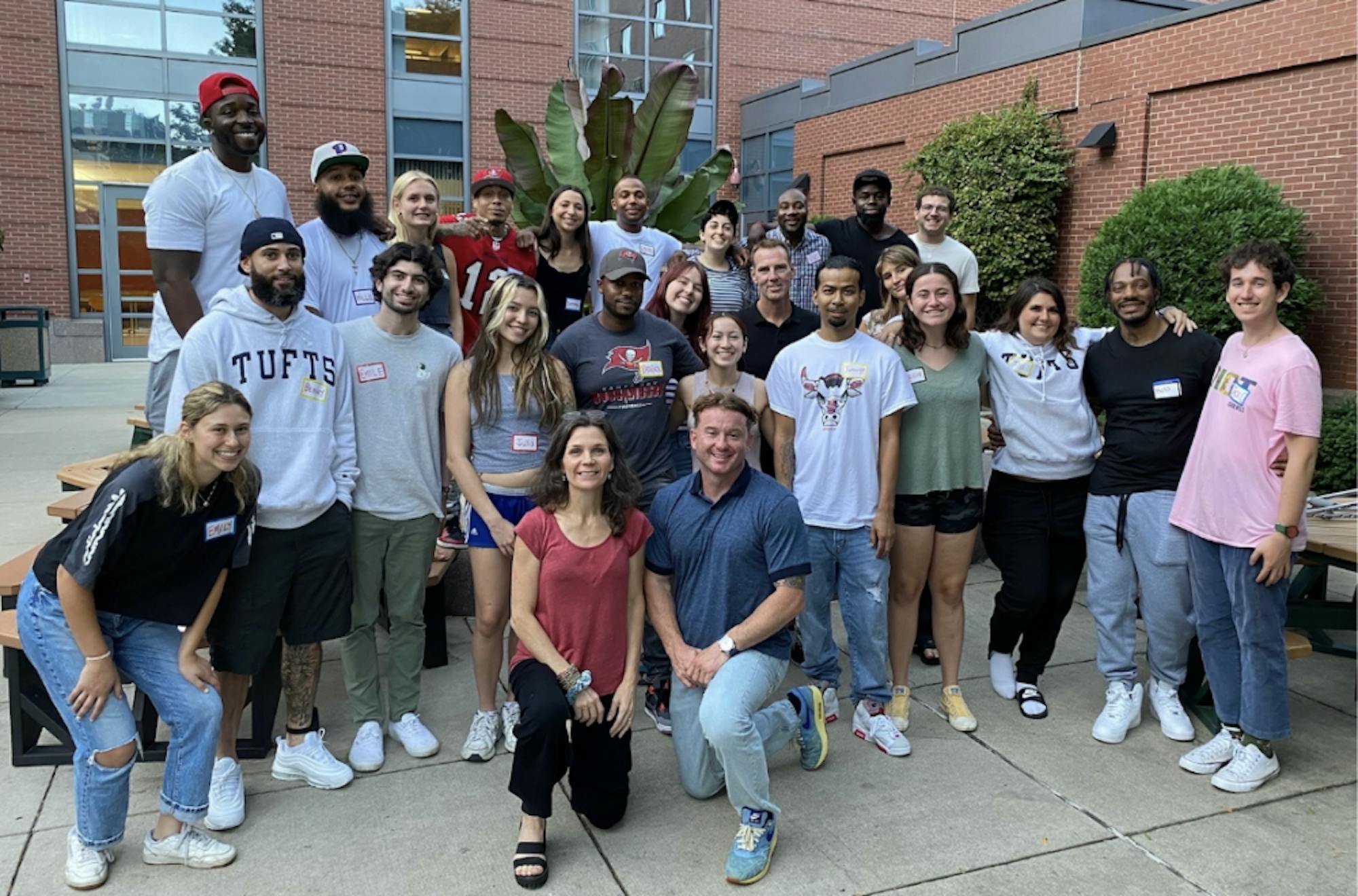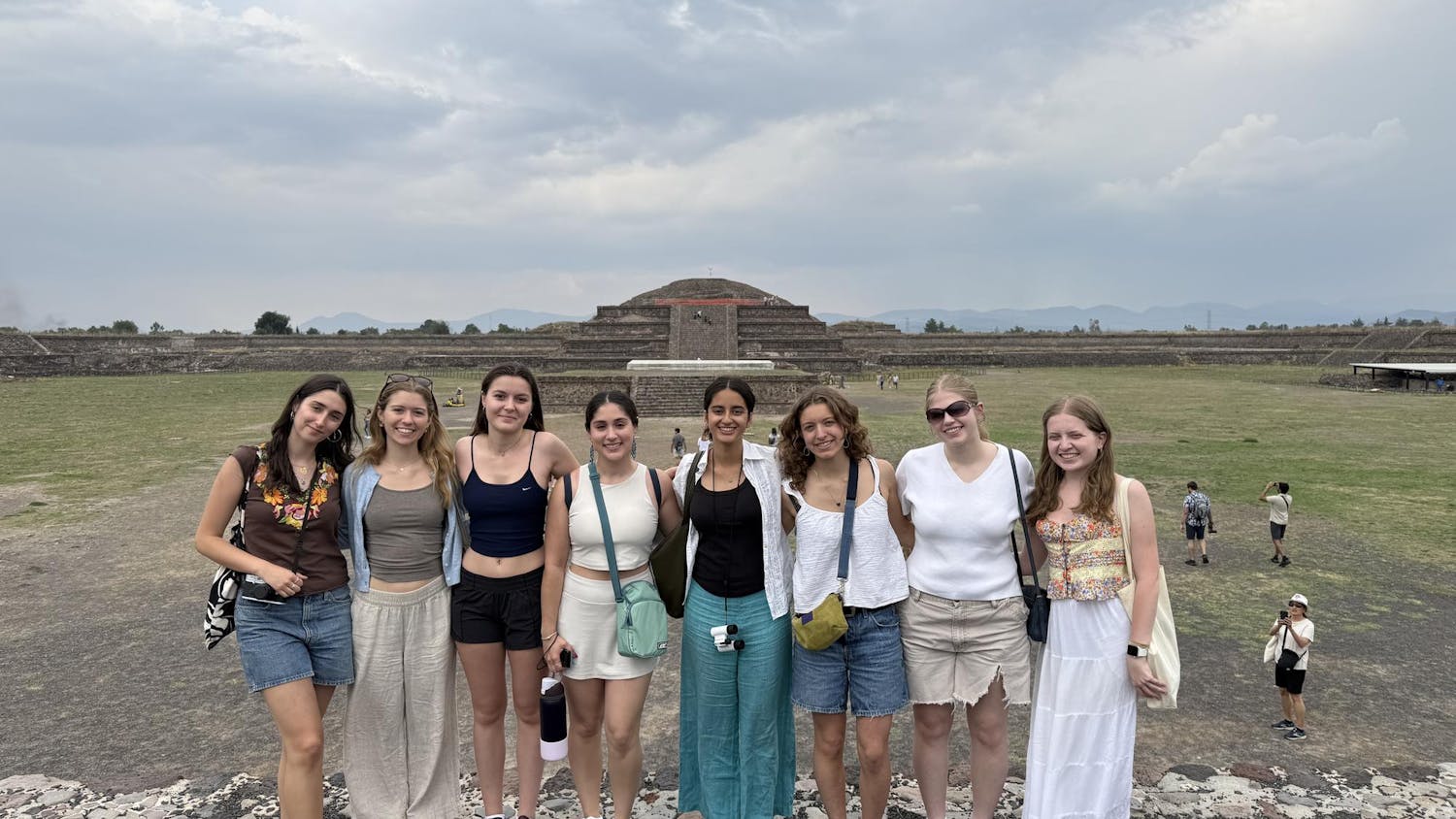Editor’s note: Presently incarcerated persons featured in the article are not identified by name, as per the instruction of the Massachusetts Department of Correction.
When Hilary Binda asks someone in her class to read or answer a question, David Delvalle is often the first to volunteer; but he hasn’t always been this eager.
“I was super shy. I didn’t want to raise my hand in class … I never wanted to give a presentation. Now, I’m the first one,” Delvalle said. “I’ll give a speech in front of the President of the United States right now and not shake up, not one time. [I] have no fear in me because I’ve already understood that I have value, I have potential.”
Delvalle, who has been out of prison for over four months after being sentenced to at least 9 1/2 years in state prison, is one of roughly 15 students participating in one of three main programs run by TUPIT, which stands for the Tufts University Prison Initiative of the Tisch College of Civic Life.
In 2016, Binda, a senior lecturer in the Department of Civic Studies, founded a program for Medford/Somerville Tufts students and incarcerated students to take classes alongside each other at the Souza-Baranowski Correctional Center, a maximum security facility in Lancaster, Mass. For this program, Binda developed what is now one of TUPIT’s flagship courses, the Literature of Confinement, which she has taught inside seven times since TUPIT’s founding.
At the same time, Binda and her partners developed a program for incarcerated students at the Massachusetts Correctional Institution at Concord to take Tufts classes and work towards an associate’s degree. Since Tufts doesn’t offer associate’s degrees, these degrees are awarded in partnership with Bunker Hill Community College. So far, 12 men have earned their associate’s degree through this program and are now working towards earning Tufts bachelor’s degrees in Civic Studies.
TUPIT’s third program, MyTERN, started in fall 2020 when a participant in the degree program left prison for the first time. Upon leaving, all of the support he previously had through TUPIT was no longer there. To address this, Binda, along with then-undergraduate student Claudia Guetta (A’22), who was acting in a program coordinator role, worked to create a reentry program that fit with TUPIT’s values.
Quinn Williamson, assistant director of TUPIT, explained that restorative justice is at the core of TUPIT.
“We run our program with restorative justice [centered], meaning that we care deeply about how people have harmed and also how we can heal from that harm,” Williamson said. “A part of that is running the program in a circle, and so we bring everyone together so that we see each other as a community, and can talk to each other in the full context of who we all are.”
All of TUPIT’s programs are intimately connected with the importance of community. This is something that Binda emphasized distinguishes MyTERN from many other reentry programs. By creating community, these programs give students a foundation on which to situate — and at times, partially reconstruct — their lives.
Classes on the inside take a similar community-focused approach. Senior Carolina Hidalgo-McCabe was a teaching assistant inside MCI-Concord for Spanish 2 in fall 2022. Much like a Medford/Somerville Tufts class, MyTERN teaching assistants teach weekly recitations without the professor. The Spanish 2 recitation also extends beyond intellectual pursuits; one week, Hidalgo-McCabe, the other TAs and the students worked together to turn their recitation into a salsa class.

Overall, the MyTERN program is structured so that the cohort of incarcerated students take classes together and work towards their degree.
“Some of them want to be teachers when they get out. So they’re helping other guys and there's just a total energy in the room of lifting each other up,” Hidalgo-McCabe explained. “They’re really just such a community. It’s great to see the way that the native speakers work with non-native speakers in strengthening their Spanish skills.”
At TUPIT, community and restorative justice are paired with a passionate belief in the power of education.
“Education is transformative. What I mean by that is: a humanities degree is supposed to give someone the ability to radically imagine themselves, their society and the communities in different ways,” Williamson explained. “Having that sort of radical imagination that’s supposed to be coming out of a humanities degree just widens people’s scopes and their options. If someone incarcerated can see themselves as getting a Master’s in Fine Arts, that’s life changing.”
Williamson went on to explain that the program gives participants, as well as Medford/Somerville students, a sense of freedom and a broadened perspective.
“Once you start thinking together with different groups of people in different populations, your scope is just widened, and you get a really beautiful sense of freedom from that experience,” Williamson said. “Something is changing within you, once you start imagining yourself and your experiences and your circumstances differently.”
Research backs up Williamson’s claims: there is significant academic work showing a correlation between college-in-prison and meaningfully decreased recidivism rates. The Daily obtained permission from the Department of Corrections to pass papers with questions and answers in and out of MCI-Concord with the help of Binda and Williamson.
One student, referred to under the pseudonym Neal, agreed with Williamson’s analysis.
“[I] began this journey by taking part in the Inside/out course ‘The Literature of Confinement,’ which I signed up for because I wanted to start writing again,” Neal wrote in pencil on paper. “I had no expectations beyond that. But, by the time that class was over, I was hooked on education … And now I see this program as a lifeline, as a valuable opportunity to create a real life of purpose post-incarceration. This program has come to symbolize hope to me — something I have never had in all my life.”
The program’s leaders positioned the work they were doing as an important step in the right direction but recognized the position they held relative to a massive carceral system. Both TUPIT students and Medford students described how they’ve been humbled by their work with the program.
“They’re really freaking funny, and they humble us and they make us laugh a lot in class,” Hidalgo McCabe said.
Another student inside MCI-Concord wrote, “I love the way my professors challenge me and I’ve been humbled more than a few times. Prior to TUPIT, humility did not come easy for me at all.”
Humility is especially important in this work, according to Stephan Pennington, an associate music professor who taught “History of African-American Music” in MCI-Concord in fall 2022.
“There are people who go into [this word] for weird ego reasons or self aggrandizement reasons or white savior complexes, or that kind of a thing,” he said.
Instead, Pennington views the TUPIT programs at MCI-Concord as an opportunity for both groups to learn. The risk of people coming to work with TUPIT for the wrong reasons compelled him to begin teaching inside.
“I didn’t do anything differently internally, for myself, because this is just another class. I don’t think of the students as being different. I don’t feel like I need to do something special or different,” Pennington said. “These are students, so I’m going to treat them like students.”
As TUPIT continues to develop, Binda and others are thinking about the question of who is in the room. The program teaches almost 20 classes each year and has changed the course of the lives of dozens of Medford students, MCI-Concord degree students and MyTERN students, giving them new close relationships and shifting their career paths.
Binda, whom students call a “beast” and “rockstar,” along with Williamson and TUPIT’s Faculty Advisory Committee, are working hard to keep expanding and improving the program.
Kim Ruane, professor and chair of the math department, reflected on the connections between race and the prison system. According to Ruane, Black people are massively overrepresented in the incarcerated population in the U.S. She argues that if Tufts wants to address DEIJ issues, it needs to express committed support for TUPIT.
“This university wants to be anti-racist and wants to talk about diversity, equity and inclusion and justice,” Ruane said. “They can’t just take the credit for TUPIT when it suits them and not support it. … This is a component of our DEIJ mission … and you don’t just get to use it as look-what-we-do and then not support it.”
Currently, when professors teach inside the prison, it typically doesn’t count towards their required teaching load, even though the incarcerated students are part of a faculty-approved degree program. Ruane and others called for this to change as the university takes the program more seriously. So far, the program has been funded by grants, some of which come from Tufts. The program’s leaders are also working to secure Pell Grants for students.
TUPIT has expanded its degree offerings inside: when the first cohort of students in MCI-Concord earned their associate’s degrees, they moved into a faculty-approved bachelor’s degree program from Tufts. They’re expected to complete the program in December of 2023, but there are still some logistics left.
“We are simply waiting for the administration to complete the process that will ensure that our students earn the degree for which they will have completed all requirements by December 2023,” Binda wrote in an email to the Daily.
Finally, students inside have one major request: more laptops. As of now, students have limited access to digital devices that do not require internet connection.
“Laptops would fix everything,” Neal wrote.
At the heart of TUPIT is the idea about the power of encountering another person as their full self and the transformative potential of empathy — an idea that Pennington identified as countercultural.
Delvalle agreed that TUPIT serves as a model for genuine interpersonal connections that can have broad and powerful implications.
“Bringing people together to breed more understanding about why society is the way it is, is ultimately going to be a huge factor in solving society's problems. Because until we get to be in the same spaces as each other and understand one another and have empathy for one another, we’re never going to move forward as a people,” Delvalle said. “We’re these stereotypes, these molds, these tropes the society has built, and people are kind of blindly subscribing to that — we’re breaking those.”






